13 Bizzabo Alternatives That Make Sense for Research Conferences
A few years ago, Dr. Elena Foster was organizing her first international conference on computational neuroscience. She had the speakers lined up, the abstracts flooding in, and a small but mighty team ready to tackle logistics. The problem? The event platform they’d chosen was designed more for B2B events, rather than academic or research conferences. The event management tool was eating up time, budget, and patience. It didn’t handle peer reviews well, and users were overwhelmed by the numerous marketing features that were unnecessary for their event management needs.
She’s not alone.
While platforms like Bizzabo shine in the B2B space, academic event organizers often find themselves forcing a square peg into a round hole. Academic events come with specific challenges, including abstract submissions, peer review workflows, poster sessions, student presenters, and modest budgets. What works for a 5,000-person B2B brand summit rarely works for a 500-person academic colloquium.
If you’re planning an academic conference in 2025 and need event technology that actually fits your needs, here are the best Bizzabo alternatives to consider, each with features that speak academic event planners.
Why Academics Look For Bizzabo Alternatives
At first glance, Bizzabo appears to be a versatile event management soluiton; it boasts a sleek interface, extensive features, and tools for virtual, hybrid, and in-person events. But when you’re organizing a research-focused event, those bells and whistles can quickly become roadblocks. Many academic organizers discover this the hard way, after wrestling with functionalities that don’t quite align with how academics oversee conferences.
Here’s where Bizzabo often misses the mark:
Not Built for Abstract Management and Peer Reviews
When peer review is central to your event, you can’t afford clunky workarounds.
“The abstract management feature doesn't work for our review process, so we used another tool and imported the data.”
– Shirli, Director of Corporate Events on capterra.ca
Managing submissions across different tracks and coordinating reviewers is already a complex task; using a tool that wasn’t designed for it only adds unnecessary friction.
Limited Flexibility for Hybrid and Poster Events
Academic conferences often feature poster sessions, virtual presentations, and hybrid elements, often with international speakers. Bizzabo’s rigid formats can make this more complicated than it needs to be.
“Setting up virtual exhibit booths with workarounds, we wish there were a more straightforward option.”
– Zoya, Nonprofit Org on getapp.ca
What should be a smooth setup ends up being a patchwork of improvised solutions.
Overkill for Simpler Academic Use Cases
Not every academic event is a global summit. Many are smaller, more focused, and don’t need a full-on corporate marketing machine to run smoothly.
“Bizzabo may be overwhelming for smaller events due to its extensive features, while Eventbrite’s reporting capabilities are not as advanced.”
– User on comparesto.com
Sometimes, less is more, especially when your time and resources are limited.
Steep Learning Curve & Admin Overhead
From attendee check-ins to data uploads, academic organizers need tools that work, not ones that require a dedicated tech team.
“Large data uploads take forever, or just don’t upload due to sizing issues... Changing emails on a registration is so complicated.”
– Joseph B. on remo.co
Academic staff and grad student volunteers often double as event planners. The platform should accelerate event planning processes, not slow them down.
Expensive and Opaque Pricing
With grant money and department budgets on the line, transparency matters.
“With a starting price of nearly $18,000 per year, Bizzabo's pricing is significantly higher compared to other options.”
– User on remo.co
Many organizers find themselves paying for features they don’t need or, worse, trying to fit their event into a pricing tier that doesn’t reflect their event management needs.
Top Bizzabo Alternatives for Academic Events
If you’ve ever found yourself manually piecing together abstract reviews in Google Sheets or emailing presenters last-minute Zoom links because your platform doesn’t support posters or hybrid workflows, the team at Fourwaves understands.
Luckily, there’s a growing ecosystem of event management platforms built to meet these exact needs. Some focus purely on the research community. Others are generalist tools with just the right features and pricing for universities, scientific associations, and scholarly organizers.
Here are the top Bizzabo alternatives to consider in 2025. Each may be a better fit for the unique workflows and expectations of academic events.
Fourwaves: Best for Academic and Research Conferences
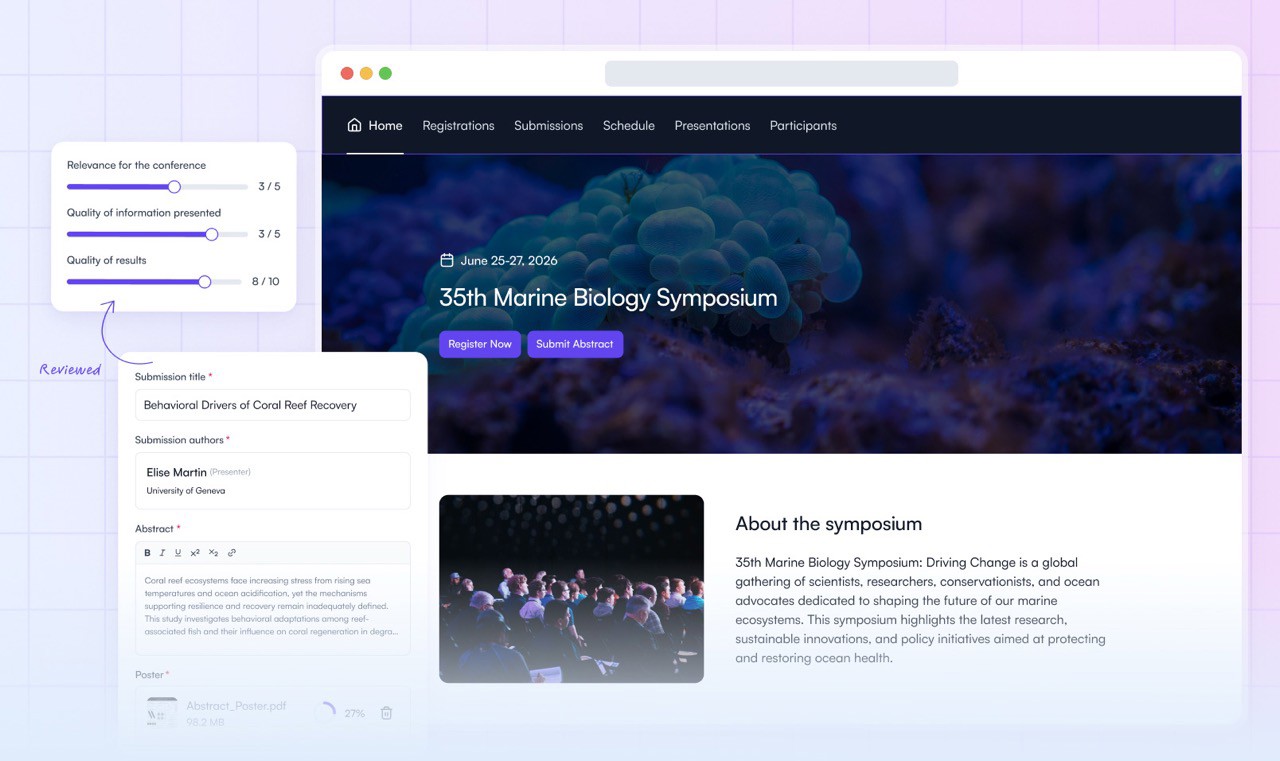
Fourwaves academic software makes it effortless to organize academic events. Instead of adapting a B2B corporate platform to fit your needs, you get built-in tools for submissions, peer reviews, and poster sessions that work out of the box. It’s developed for scholarly organizers who want to run professional, scalable events, minus the workarounds.
What distinguishes it is the meticulous attention to the needs of academic, scientific and research-focused events. It simplifies complex workflows without overwhelming organizers with technical burdens. You can choose which modules you want. The platform includes:
- A fully customizable event website that's easy to edit;
- A customizable registration forms and payment system;
- Flexible and robust abstract submission forms, able to collect precise author information, presentation materials and more;
- Managing track/topic committees;
- Managing the peer-review that adapts to your own custom flow needs
- Publishing a detailed conference program
- Exporting a custom abstract booklet
- Sending mass emails to registrants and presenters
- Generating ready to print name tags.
- Sending certificates and more.
You don’t need any technical expertise when using Fourwaves. It was built so that an event can be set up in minutes, not weeks. No technical expertise is required and the learning curve is small.
If you’re searching for a Bizzabo alternative suited for events that gathers researchers and academics, Fourwaves is in a class all on its own.
|
Feature |
Included |
|
Academic, Research, Scientific focused |
Yes |
|
Abstract management |
✔ |
|
Can you capture the author information in the submission form? |
✔ |
|
Peer-review capabilities |
✔ |
|
Track/Topic committee management |
✔ |
|
Conference website builder |
✔ |
|
Program builder with sessions and nested submission |
✔ |
|
AI assistant |
✔ |
|
Certificates of attendance |
✔ |
|
Virtual poster sessions |
✔ |
|
Integration capabilities (API) |
✔ |
|
Pricing model |
Per year, customizable. |
|
Ease of use |
High |
|
Lead Retrieval |
No |
Get started with Fourwaves today and handle abstracts, reviews, scheduling, and registration, all in one intuitive platform.
vFairs: vFairs: Best for Large Virtual & Hybrid Events
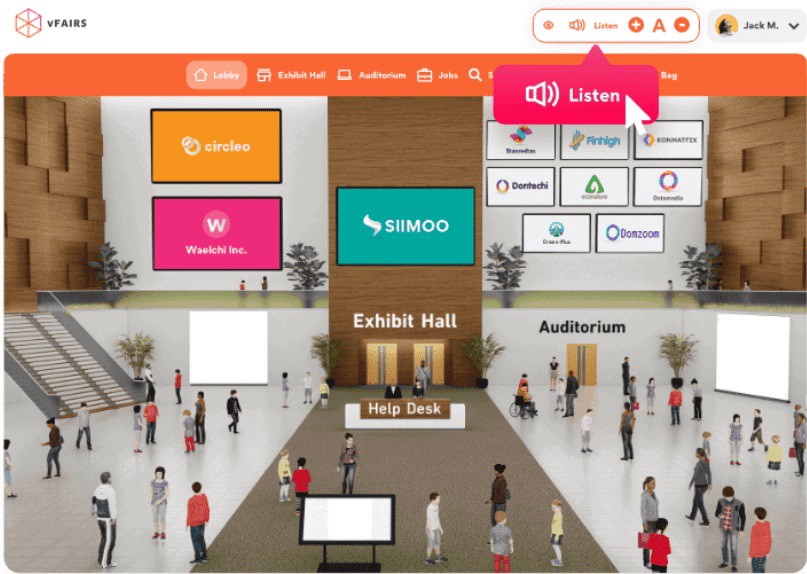
When scale is a priority, vFairs delivers. With robust support for virtual booths, real-time engagement tools, and customizable event pages, it's well-suited for large academic gatherings with global audiences. While it’s not created specifically for academic purposes, its flexibility and capacity make it a solid choice for institutions hosting complex hybrid events.
|
Feature |
Included |
|
For academic, scientific and research-based conference |
No |
|
Abstract management |
✔ |
|
Can you capture the author information in the submission form? |
✔ |
|
Peer-review capabilities |
✔ |
|
Track/Topic committee management |
✔ |
|
Conference website builder |
✔ |
|
Program builder with sessions |
✔ |
|
AI assistant |
✔ |
|
Certificate of attendance |
✔ |
|
Virtual poster sessions |
Basic |
|
Integration capabilities (API) |
✔ |
|
Pricing model |
Annual license/pay-per event |
|
Ease of use |
Medium |
|
Lead retrieval |
✔ |
Whova
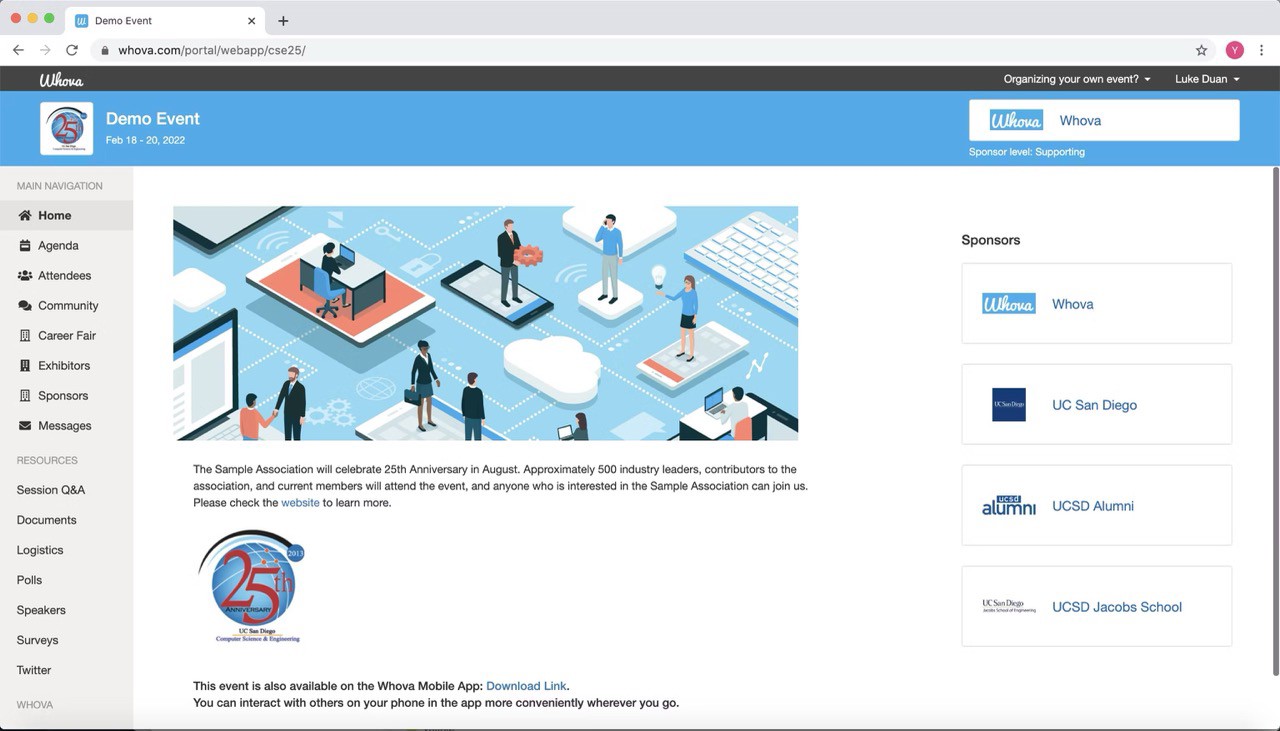
Whova is conducive for creating a connected event experience. Its user-friendly mobile app encourages real-time engagement through community boards, session chats, and personalized agendas. For academic events where networking matters (whether among students, researchers, or keynote speakers), Whova makes those connections easier and more intuitive.
|
Feature |
Included |
|
For academic, scientific and research-based conference |
No |
|
Abstract management |
✔ |
|
Can you capture the author information in the submission form? |
✔ |
|
Peer-review capabilities |
✔ |
|
Track/Topic committee management |
✔ |
|
Conference website builder |
✔ |
|
Program builder with sessions |
✔ |
|
AI assistant |
✔ |
|
Certificate of attendance |
✔ |
|
Virtual poster sessions |
Basic |
|
Integration capabilities (API) |
✔ |
|
Pricing model |
Quote-based |
|
Ease of use |
Medium |
|
Lead retrieval |
✔ |
Cvent: Best for Enterprise-Level Organizations
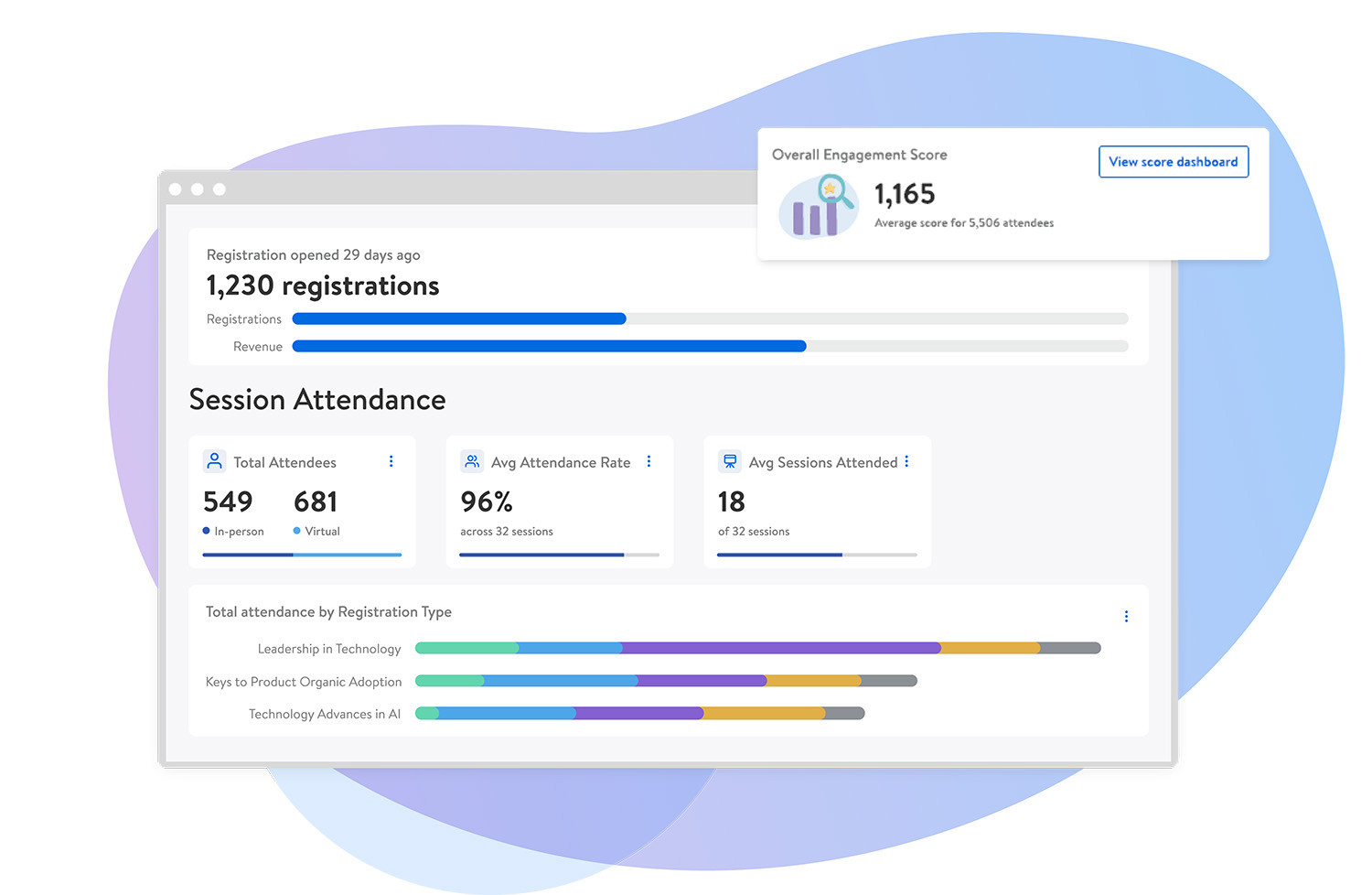
Cvent is built for institutions that manage high volumes of events across departments. Its API-connected CRM integrations, advanced reporting, and end-to-end event planning tools make it a suitable choice for universities with complex needs and dedicated event teams. While its interface can feel heavy, its scalability is hard to match, but be careful, the price will make you jump.
|
Feature |
Included |
|
For academic, scientific and research-based conference |
No |
|
Abstract management |
✔ |
|
Can you capture the author information in the submission form? |
X |
|
Peer-review capabilities |
✔ |
|
Track/Topic committee management |
X |
|
Conference website builder |
✔ |
|
Program builder with sessions |
✔ |
|
AI assistant |
X |
|
Certificate of attendance |
✔ |
|
Virtual poster sessions |
X |
|
Integration capabilities (API) |
✔ |
|
Pricing model |
Quote required |
|
Ease of use |
Medium |
|
Lead retrieval |
✔ |
Stova: Best for End-to-End Customization
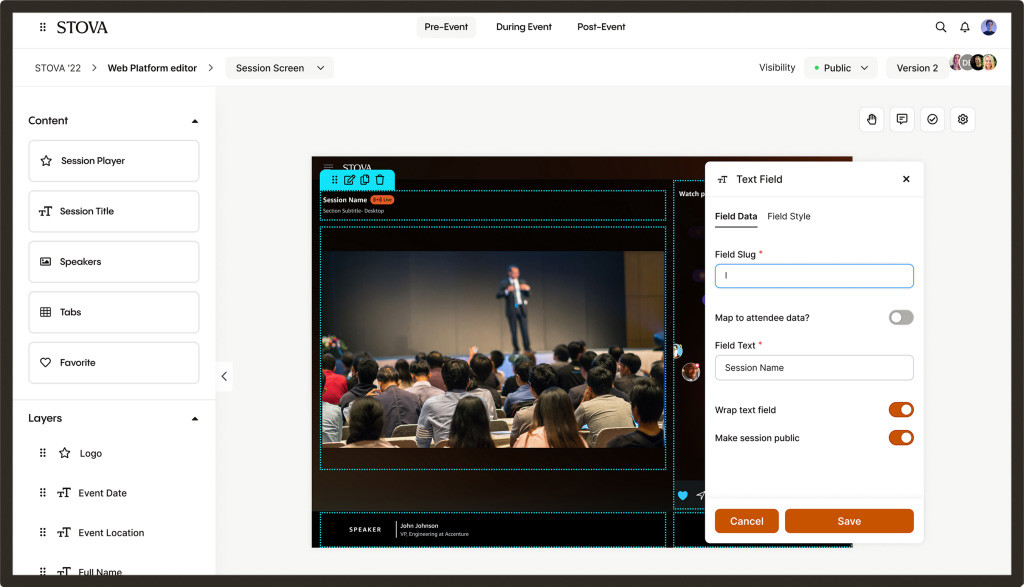
Stova offers deep control over the event experience—from branded registration flows to tailored attendee journeys. It’s a good fit for academic planners who need flexibility without sacrificing functionality. With tools for virtual, hybrid, and onsite events, it adapts well to conferences that don’t follow a one-size-fits-all model.
|
Feature |
Included |
|
For academic, scientific and research-based conference |
No |
|
Abstract management |
✔ |
|
Can you capture the author information in the submission form? |
✔ |
|
Peer-review capabilities |
✔ |
|
Track/Topic committee management |
✔ |
|
Conference website builder |
✔ |
|
Program builder with sessions |
✔ |
|
AI assistant |
X |
|
Certificate of attendance |
X |
|
Virtual poster sessions |
X |
|
Integration capabilities (API) |
✔ |
|
Pricing model |
Quote required |
|
Ease of use |
Medium |
|
Lead retrieval |
X |
Splash: Best for Visually Stunning Event Pages
Splash focuses on design-forward event marketing. If your academic event needs beautifully branded registration pages, polished email campaigns, and seamless social media integrations, Splash delivers. It’s ideal for departments or institutions looking to boost attendance through strong visual appeal without relying on a web team.
|
Feature |
Included |
|
For academic, scientific and research-based conference |
No |
|
Abstract management |
X |
|
Can you capture the author information in the submission form? |
X |
|
Peer-review capabilities |
X |
|
Track/Topic committee management |
X |
|
Conference website builder |
✔ |
|
Program builder with sessions |
Partial |
|
AI assistant |
X |
|
Certificate of attendance |
X |
|
Virtual poster sessions |
X |
|
Integration capabilities (API) |
✔ |
|
Pricing model |
Subscription plans |
|
Ease of use |
High |
|
Lead retrieval |
✔ |
Eventtia: Eventtia: Best for Mid-Size Teams With Complex Needs
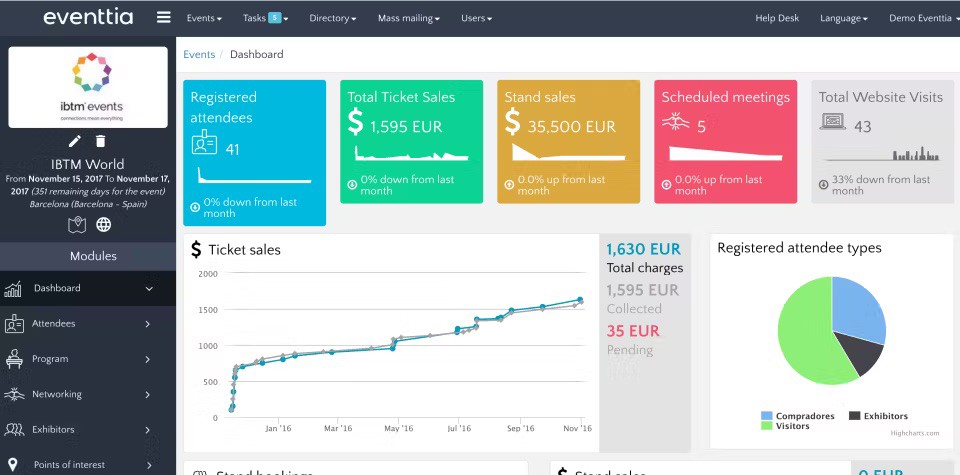
Eventtia strikes a balance between power and usability. It offers flexible tools for registration, scheduling, and attendee management without requiring a large technical team. For academic event planners juggling multiple tracks, speakers, and formats, it provides the structure needed to stay on top of every event management detail.
|
Feature |
Included |
|
For academic, scientific and research-based conference |
No |
|
Abstract management |
X |
|
Can you capture the author information in the submission form? |
X |
|
Peer-review capabilities |
X |
|
Track/Topic committee management |
X |
|
Conference website builder |
✔ |
|
Program builder with sessions |
✔ |
|
AI assistant |
X |
|
Certificate of attendance |
X |
|
Virtual poster sessions |
X |
|
Integration capabilities (API) |
✔ |
|
Pricing model |
License plans |
|
Ease of use |
High |
|
Lead retrievla |
✔ |
Eventdex: Best for Trade Shows and Lead Management
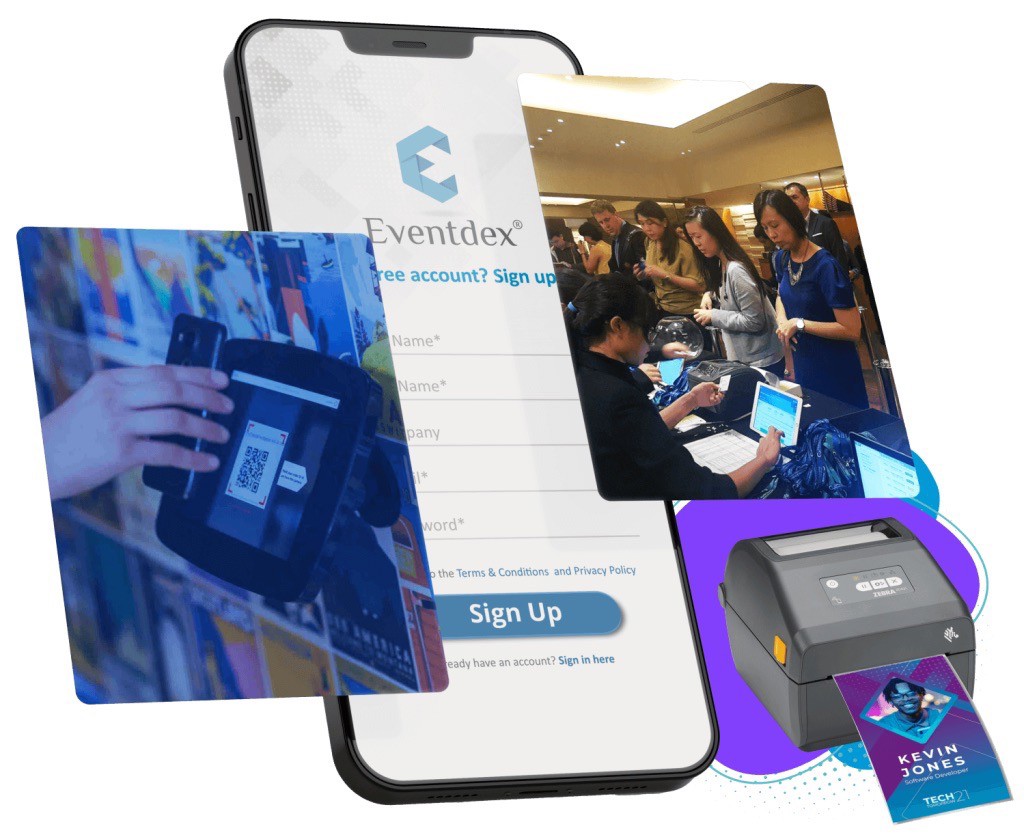
Eventdex streamlines the logistics behind academic events with strong automation features and fast, reliable check-in solutions. From badge printing to real-time attendee tracking, it helps reduce manual work onsite. It's especially useful for organizers who want to simplify entry workflows and keep sessions running smoothly.
|
Feature |
Included |
|
For academic, scientific and research-based conference |
No |
|
Abstract management |
X |
|
Can you capture the author information in the submission form? |
X |
|
Peer-review capabilities |
X |
|
Track/Topic committee management |
X |
|
Conference website builder |
✔ |
|
Program builder with sessions |
✔ |
|
AI assistant |
✔ |
|
Certificate of attendance |
X |
|
Virtual poster sessions |
X |
|
Integration capabilities (API) |
✔ |
|
Pricing model |
License plans |
|
Ease of use |
High |
|
Lead retrieval |
✔ |
Eventbrite: Best for Simpler, Public-Facing Events
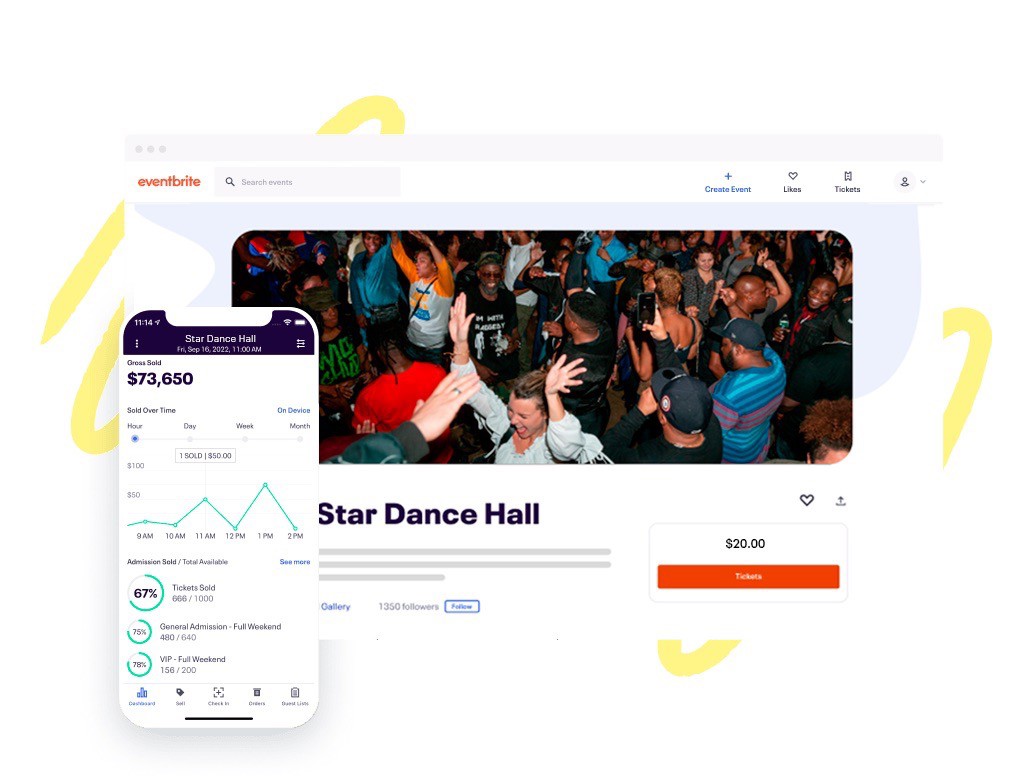
Eventbrite is ideal for academic events open to the public, like community lectures, student showcases, or alumni talks. It handles ticketing, event pages, and basic registration with ease. While it lacks advanced features for abstract management or hybrid formats, its simplicity and name recognition make it a go-to for straightforward setups.
|
Feature |
Included |
|
For academic, scientific and research-based conference |
No |
|
Abstract management |
X |
|
Can you capture the author information in the submission form? |
X |
|
Peer-review capabilities |
X |
|
Track/Topic committee management |
X |
|
Conference website builder |
✔ |
|
Program builder with sessions |
✔ |
|
AI assistant |
✔ |
|
Certificate of attendance |
X |
|
Virtual poster sessions |
X |
|
Integration capabilities (API) |
✔ |
|
Pricing model |
Service fees per ticket and payment processing fees |
|
Ease of use |
High |
|
Lead retrieval |
X |
EventMobi: Best for Engagement and Agenda Design
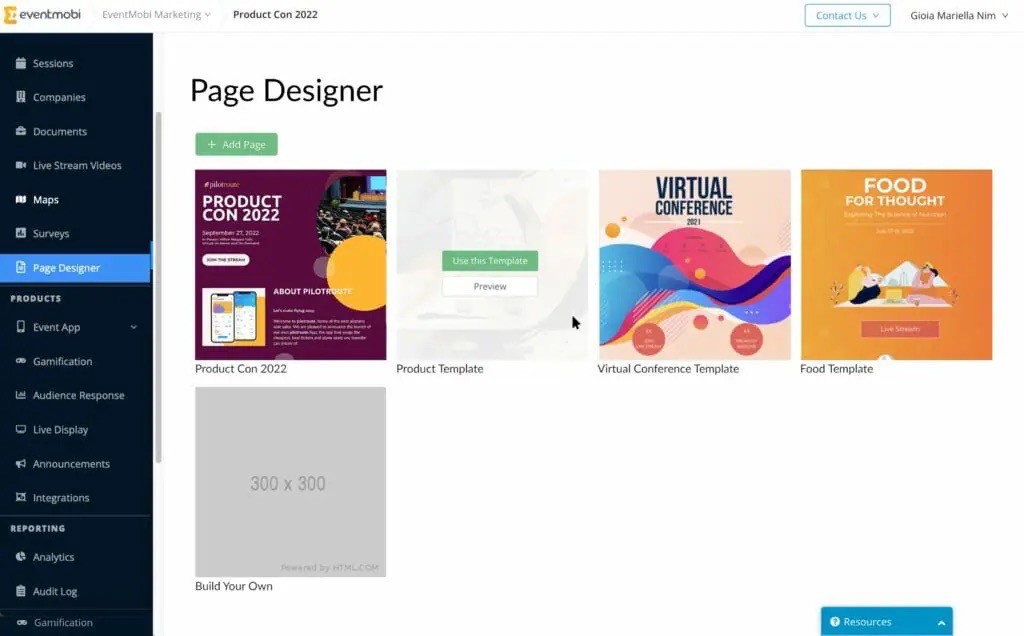
With a flexible agenda builder and built-in engagement tools, EventMobi makes it easy to keep attendees connected and informed. Whether you’re hosting a multi-track symposium or a two-day hybrid event, it offers a polished usesr experience from check-in to the final session.
|
Feature |
Included |
|
For academic, scientific and research-based conference |
No |
|
Abstract management |
X |
|
Can you capture the author information in the submission form? |
X |
|
Peer-review capabilities |
X |
|
Track/Topic committee management |
X |
|
Conference website builder |
✔ |
|
Program builder with sessions |
✔ |
|
AI assistant |
X |
|
Certificate of attendance |
X |
|
Virtual poster sessions |
X |
|
Integration capabilities (API) |
✔ |
|
Pricing model |
Per event, annual subscription |
|
Ease of use |
High |
|
Lead retrieval |
✔ |
Accelevents: Best for Virtual Poster Sessions and Expo-Style Events
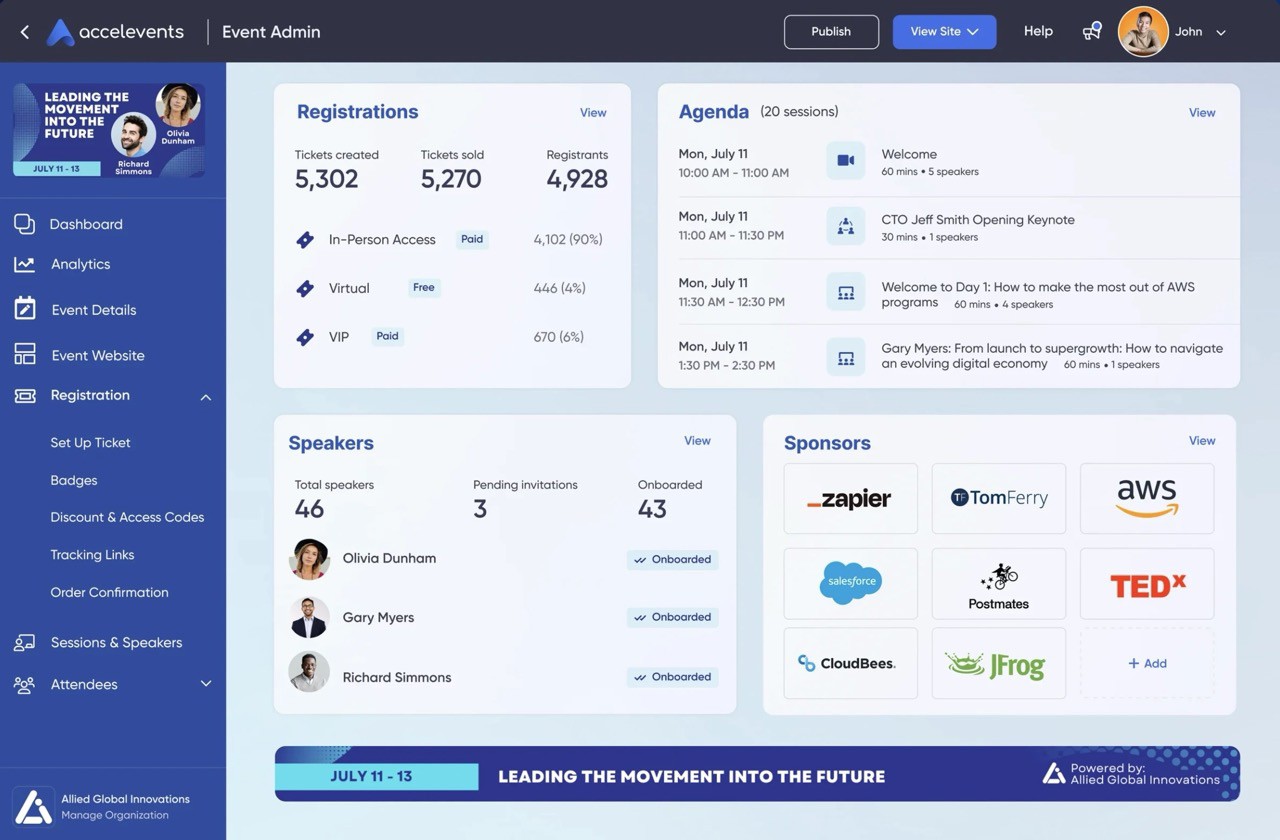
Accelevents combines virtual booths, networking lounges, and customizable poster areas to replicate the feel of an academic expo online. It’s particularly useful for showcasing research projects or student work in a way that feels interactive and immersive. For academic events with a strong visual or exhibitor component, you may want to explore this event management software.
|
Feature |
Included |
|
For academic, scientific and research-based conference |
X |
|
Abstract management |
✔ |
|
Can you capture the author information in the submission form? |
✔ |
|
Peer-review capabilities |
✔ |
|
Track/Topic committee management |
Limited to tracks in the program, not committees |
|
Conference website builder |
✔ |
|
Program builder with sessions |
✔ |
|
AI assistant |
X |
|
Certificate of attendance |
X |
|
Virtual poster sessions |
X |
|
Integration capabilities (API) |
✔ |
|
Pricing model |
Tiered licensing plans |
|
Ease of use |
High |
|
Lead retrieval |
✔ |
Fliplet: Best for No-Code Custom Event Apps
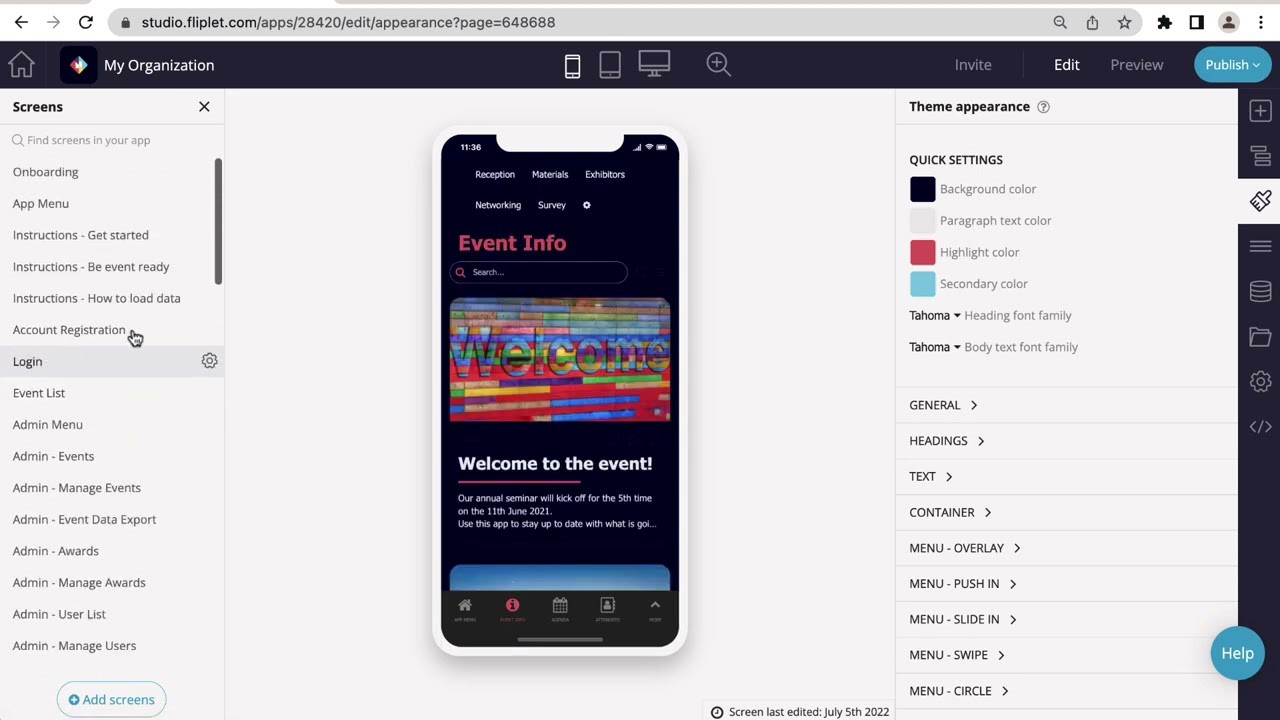
Fliplet empowers academic teams to build tailored event apps—without writing a single line of code. From schedules and speaker bios to real-time notifications and attendee messaging, everything can be customized to fit your event’s structure and branding. It’s ideal for universities that want a mobile-first experience without relying on developers.
|
Feature |
Included |
|
For academic, scientific and research-based conference |
No |
|
Abstract management |
X |
|
Can you capture the author information in the submission form? |
X |
|
Peer-review capabilities |
X |
|
Track/Topic committee management |
X |
|
Conference website builder |
✔ |
|
Program builder with sessions |
✔ |
|
AI assistant |
✔ |
|
Certificate of attendance |
X |
|
Virtual poster sessions |
X |
|
Integration capabilities (API) |
✔ |
|
Pricing model |
Subscription plans and extra fees for advanced features |
|
Ease of use |
High |
|
Lead retrieval |
Partial - The building blocks are there, but you need to wrire things up with integrations. |
What Academic Event Organizers Should Look For
Choosing the right event platform shouldn’t be about checking off features in a list. The event management platform you opt for should be developed for the way academic events actually planned and managed. Whether you’re hosting a small research colloquium or a large international scientific conference, here’s what truly matters when evaluating event management software for academia.
Abstract Management and Peer Review Workflows
This is the backbone of most academic conferences. Look for platforms that offer customizable submission forms, built-in review tools, and automated communication with authors and reviewers. Manual workarounds eat up time and increase the risk of errors.
Here are some aspects to consider for abstracts management and peer-review:
- Flexible submission forms: The submission forms need to be flexible enough to customize each field and allow for capturing different information depending on the submitter's choice. For example, different presentation types require different sets of questions.
- Structured author capture: Whova only provides a text box. With Fourwaves, you can capture precise author information. Additionally, we distinguish between the submitter, presenters, and other authors, which allows for targeted email communication and enables sharing accurate information in the program, among other benefits.
- Multi-stage process: Often, submitters whose submissions are accepted are required to return to their forms to make edits or upload supporting documents.
- Blind-review modes: You may need to accommodate both single- and double-blind processes. Unlike Whova, Fourwaves allows you to control precisely which fields are visible to reviewers; for instance, you can hide submitter and author information.
- Tracks management: For larger events, designate committee members for each track to manage submissions, and empower track chairs to oversee the peer-review process, make decisions, and schedule submissions for their sessions.
- Share feedback with authors: Academic events often require the automatic sharing of review results with authors, allowing them to revise their submissions.
- Flexible rubrics: Customizing the reviewing form is essential for a thorough review process. It often requires more than just scores from 1 to 5. Qualitative comments and even file uploads are often necessary; for instance, a reviewer may want to share a revised version with tracked changes.
- Bulk file export: With Fourwaves, you have dedicated fields to collect supplementary materials (poster, slides, videos, images and even other custom files). You can mass export those files into organized folders, ready for the day of the event.
- Abstract booklet: The ability to automatically generate an abstract booklet is vital, whether for sharing with attendees, for archival purposes, or for creating proceedings that can be sent to a publisher. The booklet contains detailed abstracts, which are sometimes grouped and sorted in a specific manner. They may also need to include images. It often features an author index with associated abstract numbers. Completing this manually is extremely time-consuming and prone to errors. Fourwaves enables you to create a customized Abstract Booklet in a Word document, allowing for further editing and formatting.
- Flexible abstract numbering: Being able to number presentations with a custom nomenclature is extremely helpful. Organizers can use this numbering for internal communications, which helps structure the program and benefits participants. For example, P85 for Poster #85 or S3.O1 for oral presentation 1 of Session 3. Whova lacks this feature. In Fourwaves, you can modify the presentation numbers to correspond with your own custom nomenclature.
- Reports: It’s crucial to filter and sort submissions using form fields, for instance, to generate custom reports, send targeted emails, build the program easily, or manage reviewer assignments. Whova provides limited information about your submissions in the data section, while Fourwaves offers comprehensive data with advanced sorting and filtering options. For instance, you can filter for submissions missing a required file, such as a poster or PowerPoint presentation, and send a mass email to the submitters.
Poster Sessions and Virtual/Hybrid Flexibility
Academic events often rely on poster presentations to showcase research, especially student work. The platform should support poster uploads and make them easily accessible.
If you have a virtual audience, it has to be very easy to organize virtual poster sessions where presenters and participants can meet in live video group conversations. Without the right tools, this can be tedious to organize and it can be tempting to remove them from the virtual program.
Session Scheduling
Organizing parallel sessions with different chairs, rooms, and time zones can get messy fast. The right platform should help you manage your program without spreadsheets, ensuring fluid transitions and up-to-date agendas:
- Sessions with nested presentations: In academic events, you should have sessions that can contain presentations (submissions) within them, each with its own presentation times.
- Drag-and-drop builder: It should be simple for a program chair to drag and drop presentations to reorder them efficiently.
- Grid view: It’s important to be able to view the program in a grid-like format to clearly show parallel sessions, rather than a linear program. This helps participants plan their agenda.
- Personal agenda: Participants should be able to create their own personal agendas and bookmark their presentations and sessions.
- Program export: It’s common at academic events to export the program (simplified or detailed with presentation and author information) and share it with participants.
Budget-Friendliness and Transparent Pricing
University and departmental budgets are tight. Avoid platforms with vague pricing tiers or surprise fees. Instead, prioritize software with clear packages and features you can actually use, without paying for enterprise extras you don’t need.
Easy-to-Use for Non-Tech-Savvy Committees
Not every planning team has an IT specialist on board. Choose platforms with intuitive dashboards and comprehensive onboarding resources so that faculty members, volunteers, and administrative staff can quickly get started without a steep learning curve.
Data Export, Reporting, and Archiving
From attendance records to submitted abstracts, academic events generate data that often needs to be archived or included in grant reporting. Ensure your platform provides robust export options and post-event reporting that doesn’t require an additional tool to decipher and analyze.
Ready to Try a Bizzabo Alternative Built for Academic Conferences?
Academic conferences are where discoveries are shared, collaborations begin, and careers take shape. But they need the right event management tools behind the scenes to maximize success.
If Bizzabo feels too heavy, too generic, or too focused on metrics that don’t matter to your community, there’s a better fit. Fourwaves was built to support the academic process, from submission to session, from poster to post-event reporting.
Join the growing number of organizers who are choosing a platform that actually gets it.
Schedule a demo with Fourwaves today.
Bizzabo Alternatives - FAQs
If you're organizing academic events, Bizzabo may feel like overkill. It's packed with corporate-focused marketing tools but lacks functionalities like abstract submission workflows, peer review support, and easy multi-track scheduling.
Many academic planners find it expensive, hard to customize for their use case, and unnecessarily complex for their teams.
Yes. Platforms like Fourwaves offer built-in tools to support virtual and hybrid poster sessions, including presenter uploads, live discussions, and interactive poster galleries. These options are far more suited to research-focused events than traditional corporate tools.
Several event management platforms offer a smoother experience, especially for non-technical users. Fourwaves and vFairs are renowned for their ease of use, clean interfaces, and minimal learning curves. They are go-to solutions for academic committees or volunteers who don’t have time for a complex setup.
Absolutely. Cost-effective event management platforms can offer support for virtual and hybrid formats without the high price tag. Many offer breakout rooms, virtual poster sessions, session streaming, and engagement tools that meet the needs of academic audiences.
Many virtual event platforms integrate with marketing tools like Zoom, Webex, Salesforce, and other CRMs. If integration is a key factor for your workflow, especially for marketing, attendee engagement, or post-event follow-up, Cvent, Fourwaves and Accelevents are worth considering.
Yes, Fourwaves and Eventbrite are free alternatives. Fourwaves has a 100% free tier package that includes unlimited registrations, basic event website and abstract submission system for up to 25 submissions.


